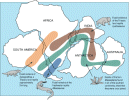WL Craig: The Kalam Cosmological Argument
Craig's arguments for God, Pt 2
Moderators: kiore, Blip, The_Metatron
Re: WL Craig: The Kalam Cosmological Argument
Indeed. In the end 'God' is just that which meets the terms of definition for 'God' - God is omni-omni because whatever is omni-omni is God, etc.
"No-one is exempt from speaking nonsense – the only misfortune is to do it solemnly."
Michel de Montaigne, Essais, 1580
Michel de Montaigne, Essais, 1580
-

THWOTH - RS Donator
- Posts: 38753
- Age: 59
- Country: Untied Kingdom

Re: WL Craig: The Kalam Cosmological Argument
THWOTH wrote:Indeed. In the end 'God' is just that which meets the terms of definition for 'God' - God is omni-omni because whatever is omni-omni is God, etc.
But not too Omni ....
http://www.religionnews.com/2014/10/27/ ... -creation/
“When we read about Creation in Genesis, we run the risk of imagining God was a magician, with a magic wand able to do everything. But that is not so,” Francis said.
I like to imagine ...
-

John Platko - Name: John Platko
- Posts: 9411

- Country: US

Re: WL Craig: The Kalam Cosmological Argument
This isn't anything to do with God though. You can be a sceptic to any and all claims of knowledge (Brains in vats! Evil Geniuses! Idealism! Solipsism!). So God can't know he's omnipotent you say? Well how do you know that? How are you going to show your knowledge is less fallible than God's hypothetically would be?
And so the merry-go round of epistemology goes.
And so the merry-go round of epistemology goes.
-

Thommo - Posts: 27477
Re: WL Craig: The Kalam Cosmological Argument
- Attachments
-
- magic.jpg (36.88 KiB) Viewed 1897 times
.
"Isn't it enough to see that a garden is beautiful without having to believe that there are fairies at the bottom of it too?" – Douglas Adams
"Isn't it enough to see that a garden is beautiful without having to believe that there are fairies at the bottom of it too?" – Douglas Adams
-

murshid - Name: Murshid
- Posts: 9240

Re: WL Craig: The Kalam Cosmological Argument
Thommo wrote:And so the merry-go round of epistemology goes.
Gershwin had much to say about carousels...
You're correct, of course. Omniscience isn't actually contradictory, only bollocks.
- hackenslash
- Name: The Other Sweary One
- Posts: 22910
- Age: 54

- Country: Republic of Mancunia
Re: WL Craig: The Kalam Cosmological Argument
Thommo wrote:This isn't anything to do with God though. You can be a sceptic to any and all claims of knowledge (Brains in vats! Evil Geniuses! Idealism! Solipsism!). So God can't know he's omnipotent you say? Well how do you know that? How are you going to show your knowledge is less fallible than God's hypothetically would be?
And so the merry-go round of epistemology goes.
Good points.
So what we can say is that we cannot be in a position to rationally believe the claim that god's omnipotence is logically possible. We have to remain technically agnostic on the claim, and so should not believe either position.
Why? Well because, while we cannot show that omniscience is logically impossible, we also cannot show it's logically possible either. Beyond the mere definition of being all-knowing, it cannot be shown that such an attribute is an achievable state of affairs. Therefore I submit it cannot be rationally believed that god is omniscient. It must be beleived on faith, and faith is intrinsically irrational. Case closed.
Half-Life 3 - I want to believe
-

Rumraket - Posts: 13264
- Age: 43
Re: WL Craig: The Kalam Cosmological Argument
God's knowledge is not usually construed as justified true belief, so I dunno.
When the straight and narrow gets a little too straight, roll up the joint.
Or don't. Just follow your arrow wherever it points.
Kacey Musgraves
Or don't. Just follow your arrow wherever it points.
Kacey Musgraves
-

Spinozasgalt - RS Donator
- Name: Jennifer
- Posts: 18787
- Age: 37

- Country: Australia

Re: WL Craig: The Kalam Cosmological Argument
Nothing about god is ever justified...
- hackenslash
- Name: The Other Sweary One
- Posts: 22910
- Age: 54

- Country: Republic of Mancunia
Re: WL Craig: The Kalam Cosmological Argument
Rumraket wrote:Why? Well because, while we cannot show that omniscience is logically impossible, we also cannot show it's logically possible either. Beyond the mere definition of being all-knowing, it cannot be shown that such an attribute is an achievable state of affairs.
If you can't show it to be logically impossible (it is not a contradiction), then it is logically possible.
A logically possible proposition is one that can be asserted without implying a logical contradiction. This is to say that a proposition is logically possible if there is some coherent way for the world to be, under which the proposition would be true.
http://en.wikipedia.org/wiki/Logical_possibility
Isn't whether something is an achievable state of affairs about practical possibility?
Last edited by GrahamH on Jan 05, 2015 12:41 pm, edited 1 time in total.
Why do you think that?
- GrahamH
- Posts: 20419
Re: WL Craig: The Kalam Cosmological Argument
I think part of the reason these kinds of discussion drag on is becasue the God-narrative is such a well-established and ingrained cultural trope it seems to demand we go to more robust lengths in refutation than one would generally consider needed to refute the dragon-narrative, or the fairy-narrative, or even the god-narratives of more ancient or primitive cultures.
"No-one is exempt from speaking nonsense – the only misfortune is to do it solemnly."
Michel de Montaigne, Essais, 1580
Michel de Montaigne, Essais, 1580
-

THWOTH - RS Donator
- Posts: 38753
- Age: 59
- Country: Untied Kingdom

Re: WL Craig: The Kalam Cosmological Argument
Rumraket wrote:So what we can say is that we cannot be in a position to rationally believe the claim that god's omnipotence is logically possible. We have to remain technically agnostic on the claim, and so should not believe either position.
Why? Well because, while we cannot show that omniscience is logically impossible, we also cannot show it's logically possible either. Beyond the mere definition of being all-knowing, it cannot be shown that such an attribute is an achievable state of affairs. Therefore I submit it cannot be rationally believed that god is omniscient. It must be beleived on faith, and faith is intrinsically irrational. Case closed.
Yes, I like this a lot more.
Taking into account Jennifer's comment as well, which is characteristically insightful:-
Spinozasgalt wrote:God's knowledge is not usually construed as justified true belief, so I dunno.
What then does omniscience mean? It's not what we would ordinarily call "knowledge" and it's not clear what the "all" part of "all-knowing" means either, with scholastics and the like regularly appealing to logical possibility to save the definition.
This actually ties with the Christian God's "all-loving" nature quite well too, in that his love includes having children torn apart by bears and torturing his children for believing the wrong things, setting it quite far from anything we would ordinarily call love as well.
It sometimes feels as though the phrase "all-knowing", "all-powerful", "all-loving" God exists doesn't refer to knowledge, power, love or even existence.
-

Thommo - Posts: 27477
Re: WL Craig: The Kalam Cosmological Argument
GrahamH wrote:Rumraket wrote:Why? Well because, while we cannot show that omniscience is logically impossible, we also cannot show it's logically possible either. Beyond the mere definition of being all-knowing, it cannot be shown that such an attribute is an achievable state of affairs.
If you can't show it to be logically impossible (it is not a contradiction), then it is locally possible.
Do you mean "locally possible"? or is that a typo?
-

Thommo - Posts: 27477
Re: WL Craig: The Kalam Cosmological Argument
THWOTH wrote:I think part of the reason these kinds of discussion drag on is becasue the God-narrative is such a well-established and ingrained cultural trope it seems to demand we go to more robust lengths in refutation than one would generally consider needed to refute the dragon-narrative, or the fairy-narrative, or even the god-narratives of more ancient or primitive cultures.
Yep, way more attention than is deserved because of history, culture, belief...
Kenny A. Chaffin
Art Gallery - Photo Gallery - Writing&Poetry
"Strive on with Awareness" - Siddhartha Gautama
Art Gallery - Photo Gallery - Writing&Poetry
"Strive on with Awareness" - Siddhartha Gautama
-

kennyc - Name: Kenny A. Chaffin
- Posts: 8698

- Country: U.S.A.

Re: WL Craig: The Kalam Cosmological Argument
Thommo wrote:GrahamH wrote:Rumraket wrote:Why? Well because, while we cannot show that omniscience is logically impossible, we also cannot show it's logically possible either. Beyond the mere definition of being all-knowing, it cannot be shown that such an attribute is an achievable state of affairs.
If you can't show it to be logically impossible (it is not a contradiction), then it is locally possible.
Do you mean "locally possible"? or is that a typo?
Yes, of course, it was a typo. It should have been 'logically possible'. (Now corrected.)
Why do you think that?
- GrahamH
- Posts: 20419
Re: WL Craig: The Kalam Cosmological Argument
One thing I encountered recently is the idea of "Motte and Bailey Doctrines". Full article here (it's actually a critique of postmodernism).
The KCA is merely Craig's attempt to establish a "Motte": in this case, the idea that the universe had a cause. As I've stated elsewhere, I have major problems with even the idea of atemporal causation, but this is his initial goal with the KCA. He then works out from this - by rather tenuous reasoning assertion to the idea that the universe had a Creator.
Craig's "Bailey" is of course Evangelical Christianity with all its prescriptions, proscriptions, commandments, dogma and - most importantly - authority. That's where he, like the feudal lord, he wishes to actually spend his time. The KCA is a rhetorical "fortress" he retreats to when his wider ideology comes under attack. For an even more blatant example of this strategy, check out Sy Ten Bruggencate's bullshit.
Nicholas Shackel wrote:A Motte and Bailey castle is a medieval system of defence in which a stone tower on a mound (the Motte) is surrounded by an area of land (the Bailey) which in turn is encompassed by some sort of a barrier such as a ditch. Being dark and dank, the Motte is not a habitation of choice. The only reason for its existence is the desirability of the Bailey, which the combination of the Motte and ditch makes relatively easy to retain despite attack by marauders. When only lightly pressed, the ditch makes small numbers of attackers easy to defeat as they struggle across it: when heavily pressed the ditch is not defensible and so neither is the Bailey. Rather one retreats to the insalubrious but defensible, perhaps impregnable, Motte. Eventually the marauders give up, when one is well placed to reoccupy desirable land.
For my purposes the desirable but only lightly defensible territory of the Motte and Bailey castle, that is to say, the Bailey, represents a philosophical doctrine or position with similar properties: desirable to its proponent but only lightly defensible. The Motte is the defensible but undesired position to which one retreats when hard pressed. I think it is evident that Troll’s Truisms have the Motte and Bailey property, since the exciting falsehoods constitute the desired but indefensible region within the ditch whilst the trivial truth constitutes the defensible but dank Motte to which one may retreat when pressed.
An entire doctrine or theory may be a Motte and Bailey Doctrine just by virtue of having a central core of defensible but not terribly interesting or original doctrines surrounded by a region of exciting but only lightly defensible doctrines. Just as the medieval Motte was often constructed by the stonemasons art from stone in the surrounding land, the Motte of dull but defensible doctrines is often constructed by the use of the sophists art from the desired but indefensible doctrines lying within the ditch.
Diagnosis of a philosophical doctrine as being a Motte and Bailey Doctrine is invariably fatal. Once made it is relatively obvious to those familiar with the doctrine that the doctrine’s survival required a systematic vacillation between exploiting the desired territory and retreating to the Motte when pressed.
The KCA is merely Craig's attempt to establish a "Motte": in this case, the idea that the universe had a cause. As I've stated elsewhere, I have major problems with even the idea of atemporal causation, but this is his initial goal with the KCA. He then works out from this - by rather tenuous reasoning assertion to the idea that the universe had a Creator.
Craig's "Bailey" is of course Evangelical Christianity with all its prescriptions, proscriptions, commandments, dogma and - most importantly - authority. That's where he, like the feudal lord, he wishes to actually spend his time. The KCA is a rhetorical "fortress" he retreats to when his wider ideology comes under attack. For an even more blatant example of this strategy, check out Sy Ten Bruggencate's bullshit.
"Democracy is asset insurance for the rich. Stop skimping on the payments."
-- Mark Blyth
-- Mark Blyth
-

Nicko - Name: Nick Williams
- Posts: 8643
- Age: 47

- Country: Australia

Re: WL Craig: The Kalam Cosmological Argument
THWOTH wrote:I think part of the reason these kinds of discussion drag on is becasue the God-narrative is such a well-established and ingrained cultural trope it seems to demand we go to more robust lengths in refutation than one would generally consider needed to refute the dragon-narrative, or the fairy-narrative, or even the god-narratives of more ancient or primitive cultures.
Absolutely.
If we lived in a culture in which many believed in elves, we'd have essentially the same issues when querying those who believe in them.
Iow, theism (or deism) essentially involves being inconsistent, except in a scenario where, for example, a Christian accepts that elves exist to the point that believing in them is as valid as their beliefs.
"It seems rather obvious that plants have free will. Don't know why that would be controversial."
(John Platko)
(John Platko)
- archibald
- Posts: 10311

- Country: Northern Ireland
Re: WL Craig: The Kalam Cosmological Argument
Nicko wrote:One thing I encountered recently is the idea of "Motte and Bailey Doctrines". Full article here (it's actually a critique of postmodernism).Nicholas Shackel wrote:A Motte and Bailey castle is a medieval system of defence in which a stone tower on a mound (the Motte) is surrounded by an area of land (the Bailey) which in turn is encompassed by some sort of a barrier such as a ditch. Being dark and dank, the Motte is not a habitation of choice. The only reason for its existence is the desirability of the Bailey, which the combination of the Motte and ditch makes relatively easy to retain despite attack by marauders. When only lightly pressed, the ditch makes small numbers of attackers easy to defeat as they struggle across it: when heavily pressed the ditch is not defensible and so neither is the Bailey. Rather one retreats to the insalubrious but defensible, perhaps impregnable, Motte. Eventually the marauders give up, when one is well placed to reoccupy desirable land.
For my purposes the desirable but only lightly defensible territory of the Motte and Bailey castle, that is to say, the Bailey, represents a philosophical doctrine or position with similar properties: desirable to its proponent but only lightly defensible. The Motte is the defensible but undesired position to which one retreats when hard pressed. I think it is evident that Troll’s Truisms have the Motte and Bailey property, since the exciting falsehoods constitute the desired but indefensible region within the ditch whilst the trivial truth constitutes the defensible but dank Motte to which one may retreat when pressed.
An entire doctrine or theory may be a Motte and Bailey Doctrine just by virtue of having a central core of defensible but not terribly interesting or original doctrines surrounded by a region of exciting but only lightly defensible doctrines. Just as the medieval Motte was often constructed by the stonemasons art from stone in the surrounding land, the Motte of dull but defensible doctrines is often constructed by the use of the sophists art from the desired but indefensible doctrines lying within the ditch.
Diagnosis of a philosophical doctrine as being a Motte and Bailey Doctrine is invariably fatal. Once made it is relatively obvious to those familiar with the doctrine that the doctrine’s survival required a systematic vacillation between exploiting the desired territory and retreating to the Motte when pressed.
The KCA is merely Craig's attempt to establish a "Motte": in this case, the idea that the universe had a cause. As I've stated elsewhere, I have major problems with even the idea of atemporal causation, but this is his initial goal with the KCA. He then works out from this - by rather tenuous reasoning assertion to the idea that the universe had a Creator.
Craig's "Bailey" is of course Evangelical Christianity with all its prescriptions, proscriptions, commandments, dogma and - most importantly - authority. That's where he, like the feudal lord, he wishes to actually spend his time. The KCA is a rhetorical "fortress" he retreats to when his wider ideology comes under attack. For an even more blatant example of this strategy, check out Sy Ten Bruggencate's bullshit.
Could you explain what the atemporal causation in Craig's argument is? I understand how the Aquinas's argument is atemporal but I thought Craig's was more straight forward.
I like to imagine ...
-

John Platko - Name: John Platko
- Posts: 9411

- Country: US

Re: WL Craig: The Kalam Cosmological Argument
THWOTH wrote:I think part of the reason these kinds of discussion drag on is becasue the God-narrative is such a well-established and ingrained cultural trope it seems to demand we go to more robust lengths in refutation than one would generally consider needed to refute the dragon-narrative, or the fairy-narrative, or even the god-narratives of more ancient or primitive cultures.
Yes. When someone says "There are no Tyrannosaurs rexes in existence," people don't typically respond "You can't say that. How do you know there is not an undiscovered island somewhere overrun with them? Or that some Jurassic Park-style scientist hasn't cloned them and hasn't yet revealed this to the world? Or that there isn't a distant planet somewhere where they still exist?" The context in which the person is making the statement is understood and accepted, as is the appropriate burden of proof. When God is involved, however, special pleading suddenly becomes the norm.
"A community is infinitely more brutalised by the habitual employment of punishment than it is by the occasional occurrence of crime." -Oscar Wilde
-

Shrunk - THREAD STARTER
- Posts: 26170
- Age: 59

- Country: Canada

Re: WL Craig: The Kalam Cosmological Argument
GrahamH wrote:Rumraket wrote:Why? Well because, while we cannot show that omniscience is logically impossible, we also cannot show it's logically possible either. Beyond the mere definition of being all-knowing, it cannot be shown that such an attribute is an achievable state of affairs.
If you can't show it to be logically impossible (it is not a contradiction), then it is logically possible.A logically possible proposition is one that can be asserted without implying a logical contradiction. This is to say that a proposition is logically possible if there is some coherent way for the world to be, under which the proposition would be true.
http://en.wikipedia.org/wiki/Logical_possibility
Isn't whether something is an achievable state of affairs about practical possibility?
I see what you mean and you're right, it does not explicitly imply a contradiction.
With regards to your latter point, I think it depends on what is really meant by knowledge, and we get into territory about justification and certainty.
Suppose knowledge is like having a giant list of true statements about everything there is to know about everything. Somewhere on the list is the statement "there is nothing more to be known than what is on this list". Well, we have defined the contents of the list to be true, but how would god know that they really are, beyond the statement on the list that they are? Can god have absolute certainty of that? I think these things would have to be brute facts about god. God just knows that they are true, and god just is absolutely certain about it. How? Inexplicable.
Half-Life 3 - I want to believe
-

Rumraket - Posts: 13264
- Age: 43
Re: WL Craig: The Kalam Cosmological Argument
John Platko wrote:Could you explain what the atemporal causation in Craig's argument is? I understand how the Aquinas's argument is atemporal but I thought Craig's was more straight forward.
That's your response?
Okay.
The beginning of the universe - if it ever happened - was also, by definition, the beginning of time. Any cause this event would have - assuming that it had a cause - would necessarily be atemporal. That is, if we are tracing the chain of causation back to the beginning of time the chain ends there. There is no "before" the beginning of time for a cause of the beginning of time to occupy.
Either we are dealing with some as-yet-to-be-explained kind of atemporal "cause" that somehow sidesteps this problem, or the beginning of time was a causeless event, or time has no beginning.
Given that no one has managed to put forth an idea of what the fuck an atemporal cause even is, the two latter options sound more plausible.
"Democracy is asset insurance for the rich. Stop skimping on the payments."
-- Mark Blyth
-- Mark Blyth
-

Nicko - Name: Nick Williams
- Posts: 8643
- Age: 47

- Country: Australia

Who is online
Users viewing this topic: No registered users and 1 guest